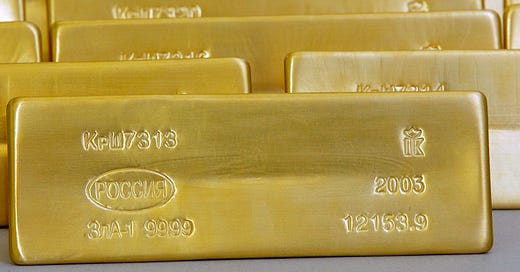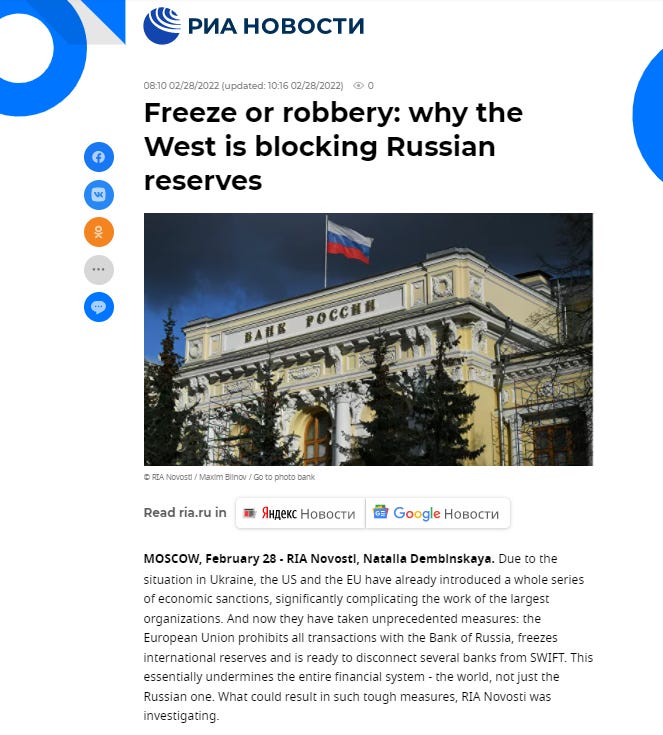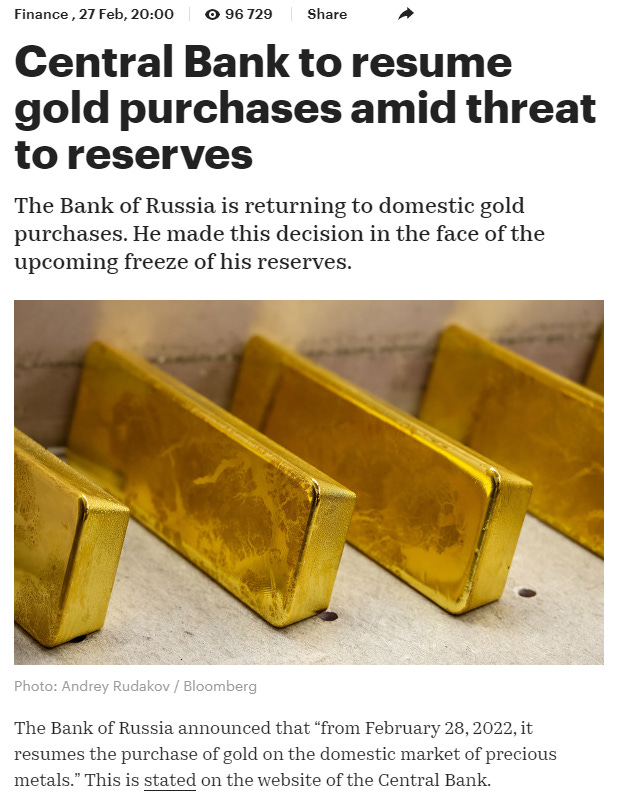Robbed again? West "freezes" Russia's reserves
Sanctions targeting Russia's central bank could lead to severe economic pain
By Riley Waggaman, a Moscow-based writer and former “senior editor” at RT
So much has happened over the past 48 hours that your humble Moscow correspondent has struggled to type a single sentence.
Well, we have to start somewhere. So let’s start with the unprecedented sanctions that could potentially trigger a global economic meltdown.
On Sunday, the European Union, the United States, Great Britain and Canada jointly announced they would freeze the reserves of the Bank of Russia. So what? All of Russia’s delicious foreign reserves are safe and sound in an underground vault in Moscow, right? Wrong.
The Bank of Russia’s mountain of reserves was allegedly supposed to protect from western financial trickery. Except… how does that work if you keep a huge portion of these assets in foreign securities or in banks that are vulnerable to sanctions? And that’s exactly what Russia’s central bank did. And now we have a problem.
This is not good:
As of February 1, the Central Bank of the Russian Federation had $630.2 billion in reserves, including $113.5 billion from the liquid part of the National Welfare Fund.
Almost half of the reserves ($311.2 billion) are placed in foreign securities, a quarter ($151.9 billion) - on deposits with foreign commercial and central banks. 132.2 billion dollars of reserves (21%) is physical gold located mainly in the vaults of the Central Bank within Russia.
Freezing reserves in a large economy like Russia is unprecedented and will have a “devastating effect,” says Tim Ash, strategist at Bluebay Asset Management: “We could see the ruble collapse.”
39% of the reserves are held in countries that have imposed sanctions.
[Update/clarification: Most of the Bank of Russia’s gold is somewhere in Russia. The sanctions primarily affect other assets held abroad.]
The outlook here is not exactly rosy:
“Sanctions against the Bank of Russia could have a huge effect on the Russian economy and banking system similar to what we saw in 1991,” warns Elena Rybakova, deputy chief economist at the Institute of International Finance. “This could lead to a run on depositors and dollarization, a sharp fall [of the ruble], depletion of reserves—and possibly the complete collapse of the Russian financial system.”
Another Russian media report gives a similar economic forecast:
“Most likely, about 70%, if not 75% of the assets of the Central Bank will be blocked. This means that the Central Bank will no longer support the ruble. He will not have significant opportunities for this,” HSE Professor Evgeny Kogan told the bfm.ru radio station.
So far, we are only talking about freezing part of our reserves, and if the situation normalizes, the money will be returned to us, however, the corridor for maneuvering to regulate the ruble exchange rate has become much narrower, Vasily Solodkov, director of the Banking Institute of the Higher School of Economics, told NG. “If the reserves are frozen, there will be physically nothing to support the ruble,” he says.
Russia’s state-run RIA Novosti described the foreign reserves freeze as a “robbery” and warned of economic chaos on a global scale:
Again, things are quite precarious:
“This is actually an attempt, this is theft, in fact, someone else's property is being snatched away,” Anatoly Aksakov, head of the State Duma committee on the financial market, assessed what is happening now with Russian reserves.
Analysts state that such extreme financial sanctions will hit not only the Russian financial system, but throughout the world. The freezing of transactions means that the work of any counterparties in the European Union, as well as the United States and Canada, will be suspended. The Bank of Russia will not be able to buy and sell foreign currency, and this will deprive European and American partners of the opportunity to pay for Russian [energy!!] exports.
What now?
The Bank of Russia has resumed gold purchases. As readers of this blog know, Russia’s central bank stopped gobbling up gold in April 2020.
Meanwhile, Russia’s finance ministry has instructed exporters to sell 80% of their foreign exchange earnings.
The central bank announced earlier today that the key rate has been raised to 20%:
External conditions for the Russian economy have changed dramatically. An increase in the key rate will make it possible to ensure an increase in deposit rates to the levels necessary to compensate for the increased devaluation and inflation risks. This will help maintain financial and price stability and protect citizens’ savings from depreciation.
It’s too soon to say whether we are witnessing a temporary market panic or something truly catastrophic. It’s 2022. Anything is possible. Never forget that.
If negotiations between Ukraine and Russia—which are being held as we type these words—are successful, will these sanctions remain in place?
And what’s the deal with the SWIFT restrictions? And is it true that your humble Moscow correspondent rushed to an ATM last night to try to withdraw cash from his US bank account, and was extremely denied?
There’s really just too much going on. The takeaway here is…. Russia’s central bank reserves: maybe not as “reserved” as we were led to believe? Strange times.
Whatever happens, there’s always the digital ruble—right?
Stay safe everyone. More soon.
—Riley








Great article.
The US- Mafia is united in celebration. North Stream 2 is dead. Germany will buy weapons from them for 100 Billion Euro this year alone.
Nato won without a single shot- "Keep the Russians out, the Americans in, and the Germans down" achieved at least for the next 10 years.
And all them stupid sheep in my country celebrate their further enslavement. Did you know that you pay around 60-70% from your money in taxes and "insurances" (do not insure very much) to the German state? This is why German population does own less than bankrupt Greece population.
Yeah... won't get better now.
You would think that a central planner er central banker would appreciate the most rudimentary mechanics of gold custodianship, especially ahead of a war, yes? And Putin would give a head's up since this "invasion" was months in the planning.
Basically, Russia has 132.2 billion dollars of gold, and not a kopek more.
The reason the rest of the gold is gone -- yes, it's not just rehypothecated to suppress global spot, but for all intents and purposes, it is not under Russian cb possession legally -- is precisely because Herman Gref et al are WEF assets, and they are by design forcing Russia to own nothing (including no gold) and be "happy".